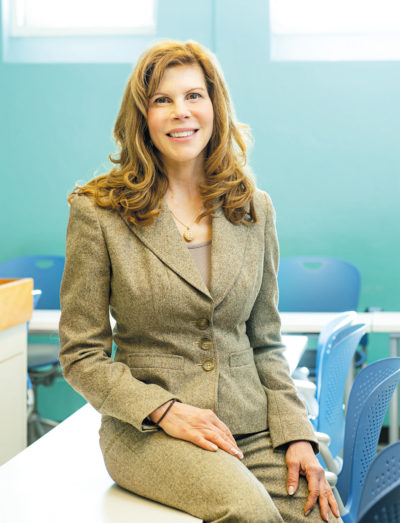
“A student will say, ‘Thank you, I’m seeing things so differently.’” – Mary Godwyn
Photo: Webb Chappell
From the state of business to the condition of the planet, the world can seem filled with inequality, intolerance, and inaction. But, Mary Godwyn, a sociology professor in the History and Society Division, remains an optimist.
In doing copious research for numerous journal articles and books in such areas as diversity, gender inequality, the environment, and business ethics, Godwyn has discovered encouraging progress being made. She’s all too happy to share it with her students.
Examining alternative ecological communities for a book she’s coauthoring gave her substantial material for her Nature and the Environment foundation course. “The first time I taught this three years ago,” Godwyn says, “it was a wonderful experience, but the environmental outlook was really discouraging. I had so little in the way of realistic and attainable solutions to offer students.”
She began researching alternative eco-communities that specifically address contemporary environmental crises and found bright spots in transition towns, communities that use grassroots efforts to reduce reliance on fossil fuels and become locally sustainable. “In many of the towns I studied,” she says, “people were renewing cooperative ties with their neighbors and committing to ethical treatment of their shared environment.”
In examining corporation case studies, Godwyn discovered most of the research focused on male business owners and decision makers and on large corporations run by well-educated white Americans. “And yet what we rely on in this country in terms of business capital,” she says, “are small businesses, and minority women and entrepreneurs are a fast-growing population of business owners.”
Revealing this evidence may rock the ground under some of her students’ feet, but that’s OK. “This disrupts the rules and images they have about who owns a business, who counts, who contributes, and what’s important to include in a business plan,” Godwyn says. She wants them to think about how business creation can reflect personal identity and community values and beliefs.
Shaking young people up has its rewards, she adds. “A student will say, ‘Thank you, I’m seeing things so differently.’ There’s a relief that they can chart a path that reflects a holistic approach to business they can really own and feel good about.” – Jeannine Stein
